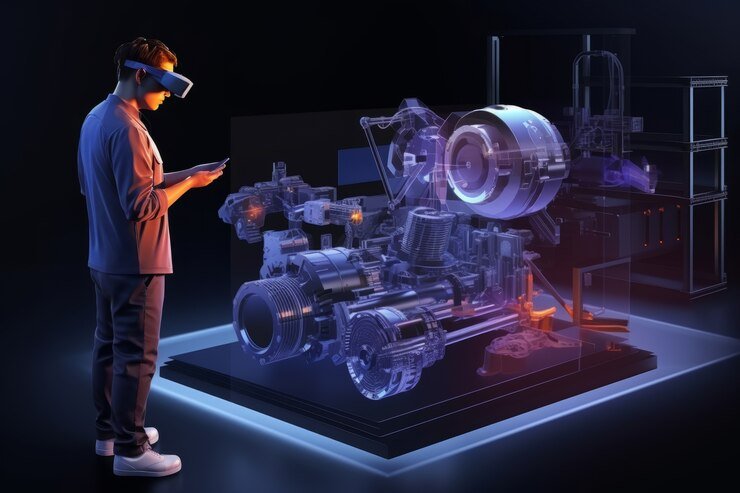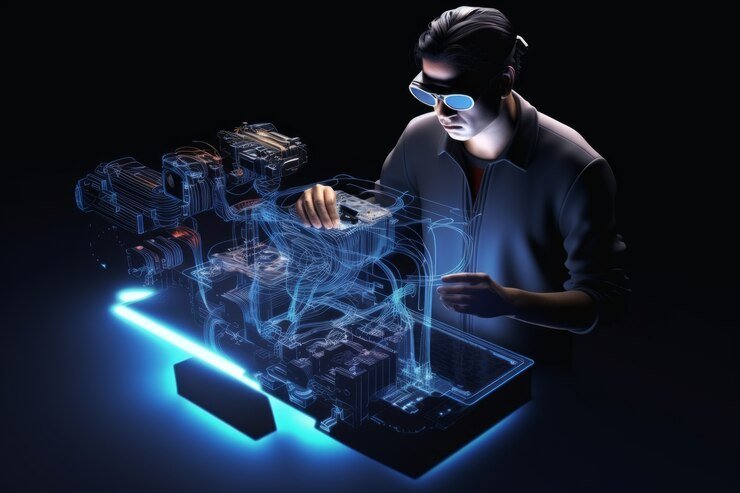Understanding the Impact of Technological Innovations on Industry
September 14, 2024 | by New IP

Introduction to Technological Innovations
The world is changing at an unprecedented pace, driven by technological innovations that are reshaping industries across the globe. From manufacturing to healthcare, businesses are continually adapting and evolving in response to new tools and techniques. These advancements not only enhance efficiency but also spark creativity, opening doors to possibilities we once thought were unattainable.
Imagine a factory where robots work alongside humans, performing tasks with precision while reducing waste. Picture healthcare professionals utilizing artificial intelligence to diagnose conditions faster than ever before. This is more than just a glimpse into the future; it’s happening right now.
As we delve deeper into the impact of these technological innovations on various sectors, you’ll discover both the remarkable benefits they bring and the challenges that accompany their adoption. Join us as we explore this fascinating landscape of transformation—where innovation meets industry!
Types of Technological Innovations in Industries
Technological innovations come in various forms, each tailored to enhance industry efficiency and effectiveness. One prominent type is process innovation, which focuses on improving production methods. This often leads to faster output and reduced costs.
Product innovations are equally significant. They introduce new or improved products that meet changing consumer demands. Companies can gain a competitive edge by offering unique features or enhanced performance.
Another vital category is business model innovation. This approach transforms how value is delivered to customers, such as subscription services replacing traditional sales models.
Additionally, incremental innovations play a crucial role in refining existing technologies incrementally over time. These small changes can lead to substantial improvements without the need for complete overhauls.
Disruptive innovations dramatically alter the market landscape by introducing groundbreaking technologies that outdate established practices. Each type of technological innovation shapes industries uniquely and drives progress forward.
Challenges Faced by Industries in Adopting Technological Innovations
Adopting technological innovations poses several challenges for industries. First and foremost, the financial burden can be significant. Many companies struggle with the costs associated with new technologies. Budget constraints often hinder progress.
In addition, there’s a skills gap that cannot be ignored. Workers may lack the necessary training to operate advanced systems effectively. This creates resistance among employees who fear losing their jobs or feel overwhelmed by new tools.
Furthermore, integrating technology into existing processes can create disruption. Companies face operational hiccups during transitions that impact productivity in the short term.
Cultural barriers also play a role. Organizations need to foster an environment of adaptability and openness to change, which is not always easy to achieve.
Cybersecurity concerns loom large as industries embrace digital solutions. Protecting sensitive data becomes paramount but complex when adopting innovative technologies.
Case Studies: Successful Implementations of Technological Innovations in Industries
The success stories of technological innovations are numerous across different industries. In the automotive sector, Tesla has redefined electric vehicles with cutting-edge battery technology and software integration. Their approach has not only boosted sales but also reshaped consumer expectations.
In healthcare, telemedicine platforms like Teladoc have transformed patient care. By enabling virtual consultations, they’ve improved access to healthcare services while reducing costs for patients and providers alike.
Retail giants like Amazon use advanced algorithms for inventory management and personalized shopping experiences. This innovation streamlines operations and enhances customer satisfaction significantly.
Agriculture is witnessing advancements through precision farming technologies. Drones equipped with sensors help farmers monitor crop health in real-time, maximizing yield efficiency while minimizing resource waste.
These examples highlight how embracing technological innovations can lead to remarkable improvements across various sectors, driving growth and resilience amid change.
The Future of Technological Innovations in Industry
The future of technological innovations in industry is bright and full of potential. Rapid advancements are on the horizon, promising to reshape how businesses operate.
Artificial intelligence will continue to refine processes, making them smarter and more efficient. Machine learning algorithms can analyze vast amounts of data, offering insights that drive better decision-making.
Moreover, the Internet of Things (IoT) will play a significant role. Connected devices will facilitate real-time monitoring and maintenance across various sectors. This connectivity can significantly enhance productivity and reduce downtime.
Sustainability also stands at the forefront of innovation efforts. Companies are increasingly seeking eco-friendly technologies that not only boost operational efficiency but also minimize environmental impact.
As industries embrace these emerging trends, collaboration between tech developers and businesses becomes essential. The synergy could lead to groundbreaking solutions that were once considered impossible.
Overview of the Impact on Industries
Technological innovations have fundamentally reshaped industries across the globe. They enhance productivity, streamline operations, and lead to significant cost reductions. Businesses can now achieve more with fewer resources.
Additionally, these advancements foster new business models. Companies are reimagining their approaches and finding novel ways to engage customers. This shift not only improves service delivery but also boosts customer satisfaction.
Moreover, technological innovations drive competition within sectors. Firms that adopt cutting-edge tools gain a competitive edge over those that remain stagnant. This dynamic creates an environment where continuous improvement becomes essential.
The integration of technology often leads to improved sustainability practices. Industries are increasingly focused on reducing waste and energy consumption through innovative processes and systems. Embracing these technologies ultimately helps create a responsible framework for future growth in various sectors.
Advancements in Manufacturing Processes
Advancements in manufacturing processes have transformed the industry landscape. Technologies like additive manufacturing, or 3D printing, allow for rapid prototyping and customized production. This shift not only speeds up time-to-market but also reduces material waste.
Another significant development is the integration of smart factories. Equipped with Internet of Things (IoT) devices, these facilities enable real-time monitoring and data analysis. Manufacturers can identify inefficiencies quickly and optimize operations seamlessly.
Moreover, advanced robotics play a crucial role in enhancing precision and safety on production lines. Collaborative robots work alongside human workers to increase productivity without compromising quality.
Sustainable practices are gaining momentum thanks to innovative technologies. Eco-friendly materials and energy-efficient machinery contribute to greener manufacturing solutions that meet modern consumer demands while protecting our planet’s resources. Embracing these advancements is vital for industries aiming to stay competitive in an ever-evolving market.
Automation in Various Industries
Automation has transformed the landscape of various industries, enabling them to enhance efficiency and productivity. In manufacturing, robots now handle repetitive tasks with precision. This reduces human error and increases output rates significantly.
In agriculture, automated systems are revolutionizing crop management. Drones equipped with sensors monitor health and growth patterns, allowing for targeted interventions that optimize yields.
Healthcare is not left behind either. Automated medical devices assist in diagnostics and patient monitoring, freeing up professionals to focus on critical care aspects.
Retail sectors use automation for inventory management through smart shelves and checkout kiosks. This streamlines operations while improving customer experiences.
Each industry faces unique challenges in adopting these innovations, yet the benefits often outweigh the hurdles. Embracing automation paves the way for a more efficient future across diverse fields.
Benefits and Challenges of Technological Innovations
Technological innovations bring numerous benefits to industries. They streamline processes, reduce costs, and enhance productivity. With automation and advanced software, businesses can operate more efficiently than ever before.
Moreover, these innovations often improve product quality and customer satisfaction. Enhanced data analytics allows companies to understand their customers better and tailor products accordingly. This leads to stronger brand loyalty.
However, the path is not without challenges. Adopting new technologies requires significant investment in training and infrastructure. Many employees may resist change due to fear of job loss or lack of understanding.
Additionally, there’s a risk of becoming too dependent on technology. Cybersecurity threats pose serious risks that could disrupt operations if not managed properly.
Balancing these benefits with potential drawbacks is crucial for sustainable success in an ever-evolving market landscape.
Future Predictions for Industry Evolution
As we gaze into the crystal ball of industry evolution, several trends emerge. One key prediction is a continued shift towards sustainability. Companies are increasingly prioritizing eco-friendly practices, driven by consumer demand and regulatory pressures.
Artificial intelligence will also play a significant role in shaping industries. From predictive analytics to enhanced customer service, AI’s capabilities will redefine operational efficiency.
Remote work technologies may become deeply integrated into corporate culture. This shift could lead to more flexible work environments, attracting diverse talent across geographical boundaries.
Moreover, the rise of blockchain technology promises greater transparency and security in supply chains. This innovation can reduce fraud and enhance trust among stakeholders.
Collaboration between traditional sectors and tech startups could spark groundbreaking solutions that address longstanding challenges within various industries. The future holds exciting possibilities for those willing to adapt and innovate.
Conclusion: Embracing Technology for a Better Future
As we navigate through the ever-evolving landscape of technological innovations, it’s clear that industries have a unique opportunity to thrive. The benefits of adopting these advancements are vast. From improved efficiency in manufacturing processes to the transformative power of automation across various sectors, technology is reshaping how we work and interact.
While challenges do exist—such as resistance to change and the need for skilled personnel—the potential rewards far outweigh the obstacles. As demonstrated by numerous case studies, companies that embrace technological innovations often find themselves at the forefront of their fields, leading with innovation and creativity.
Looking ahead, predictions suggest an even deeper integration of technology into industry practices. This evolution will not only enhance productivity but also pave the way for new job roles and opportunities that prioritize human skills alongside machine capabilities.
Industries must be proactive in embracing these shifts. By doing so, they can foster a culture that values adaptability and forward-thinking approaches. The future is bright for those willing to invest in technological innovations—a future where progress isn’t just possible but inevitable.
RELATED POSTS
View all


